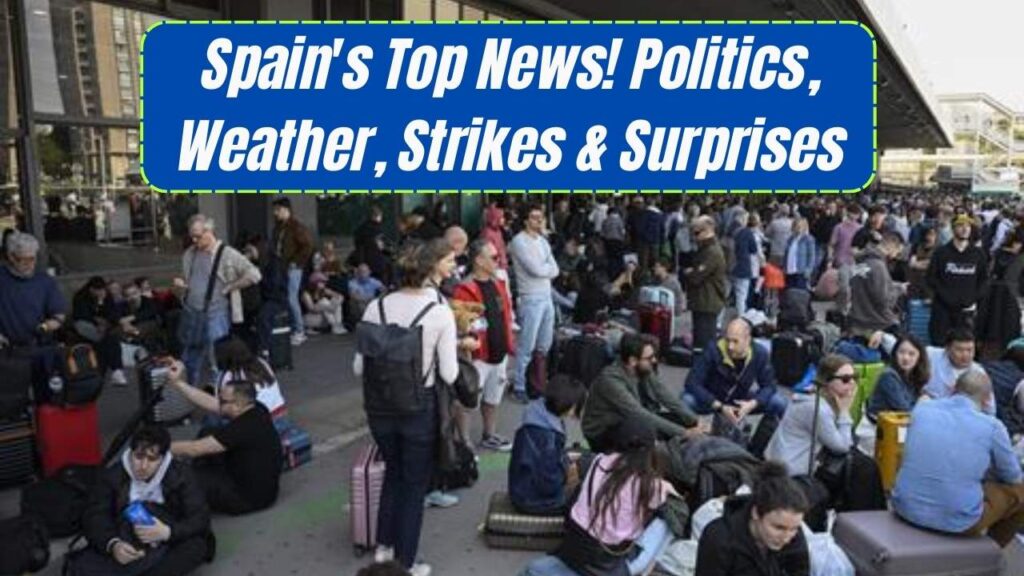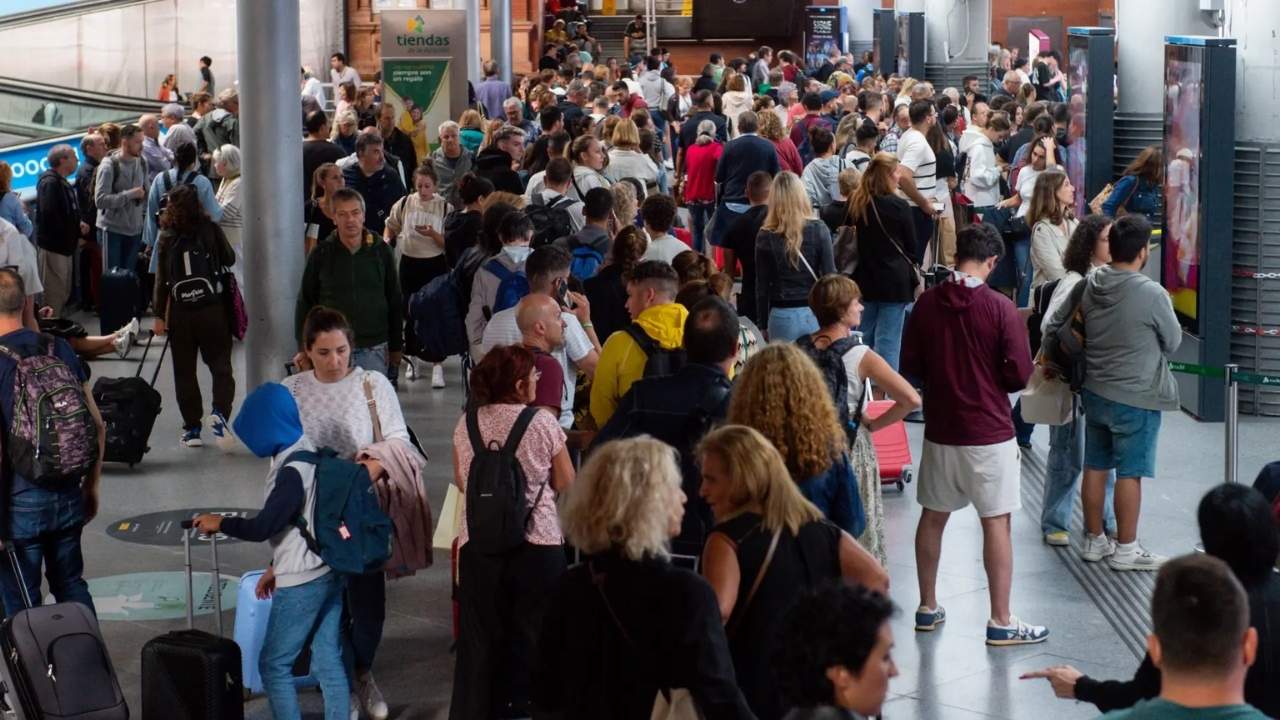
Spain, a country renowned for its rich culture, history, and stunning landscapes, is facing significant changes and challenges in various sectors. From political shifts to extreme weather conditions, labor strikes, and unexpected events, Spain’s daily headlines are packed with news that is shaping its future. In this guide, we will explore the most recent developments in Spain, covering political updates, climate changes, industrial actions, and the surprises that have recently rocked the nation. This article provides a deep dive into these issues, offering valuable insights for both general readers and professionals interested in Spain’s current affairs.
Tuesday’s Top Headlines from Spain
| Topic | Key Information |
|---|---|
| Political Landscape | The government’s public consultation on the BBVA-Sabadell merger raises concerns. |
| Weather Warnings | Yellow warnings for storms in Madrid and Valencia, impacting daily life. |
| Strikes and Transportation | EasyJet staff in Italy set to strike, affecting flights to Spain. |
| Surprises: Power Outage | A massive power outage affected millions across Spain and Portugal, lasting for 18 hours. |
| Disinformation | Following the power outage, conspiracy theories about solar flares spread across social media. |
Spain is currently facing significant changes in various sectors, from political debates surrounding the BBVA-Sabadell merger to extreme weather conditions and labor strikes. The recent power outage and the spread of disinformation serve as reminders of the importance of being prepared and informed. By staying updated on news and understanding the issues at hand, individuals and professionals can better navigate Spain’s evolving landscape. Always prioritize accurate information, stay prepared for unexpected events, and engage with the news responsibly.
Spain’s Political Landscape: The Merger Debate and Public Concerns
Spain’s political and economic climate is currently focused on a significant financial development—the potential merger between two of Spain’s major banks, BBVA and Sabadell. The €13 billion deal is under scrutiny from the Spanish government, which has launched a public consultation process to assess the merger’s impact on competition and financial stability.
What’s at Stake?
The merger of BBVA and Sabadell could create a dominant force in Spain’s banking sector. While BBVA supports the merger, Sabadell has voiced strong opposition, arguing that it could harm smaller competitors and negatively affect customers. Additionally, the Spanish government has raised concerns about job losses and the potential for reduced competition, which could lead to higher costs for consumers.
For those in the banking industry or with financial interests in Spain, keeping an eye on the ongoing consultation is essential. As the public consultation runs until May 20, industry experts and stakeholders will closely monitor the outcome.
Impact on Consumers: What to Expect
If the merger goes through, customers of both BBVA and Sabadell could experience changes in their banking services. Mergers often result in the consolidation of branches, which might lead to fewer local banking options. Additionally, there could be changes to fees, interest rates, and the overall service experience. Consumers should closely monitor any official communications from the banks regarding these potential changes.
Practical Advice for Bank Customers:
- If you bank with BBVA or Sabadell, stay informed about any changes to services, fees, or account management that may arise from the merger.
- Monitor news outlets and the official websites of both banks for updates.
Extreme Weather in Spain: Storm Warnings and Safety Tips
Spain is no stranger to unpredictable weather, and the spring of 2025 has proven to be no exception. The State Meteorological Agency has issued yellow weather warnings for thunderstorms and heavy rain in the Madrid and Valencia regions.
Understanding the Weather Warnings
The yellow alert indicates that adverse weather conditions could pose risks to public safety. While the storms are not expected to be extreme, heavy rainfall may cause localized flooding, especially in urban areas. Roads could become slick, and visibility may be reduced, making travel dangerous.
How to Stay Safe During the Storms
During storm warnings, it’s crucial to take precautions to protect yourself and your property. If you’re in the affected regions, consider securing outdoor furniture, ensuring your roof is in good condition, and checking that your drainage system is functioning properly.
Safety Tips:
- Stay informed: Regularly check weather forecasts from reliable sources like the AEMET website for real-time updates.
- Prepare for rain: If you live in affected areas, keep an umbrella and raincoat handy. Ensure your vehicle’s tires are in good condition and always drive with caution.
- Avoid unnecessary travel: If possible, delay trips until the weather improves.
For professionals in the transportation or logistics industries, adjusting delivery schedules and routes may be necessary to ensure safety and efficiency.
Strikes and Transportation Disruptions: What to Expect
Labor strikes are an ongoing issue in many European countries, and Spain is no exception. Recently, EasyJet staff in Italy announced a four-hour strike on May 18, which is likely to cause delays and cancellations of flights to and from Spain.
Economic Impact of Strikes
Strikes in the airline sector can have a significant economic impact. Spain is one of Europe’s top tourist destinations, and any disruptions to air travel can result in lost revenue for the tourism industry. Additionally, supply chains and business operations that depend on timely flights may face challenges.
How Strikes Impact the Spanish Economy and Travelers
Strikes, particularly in the transportation sector, can lead to significant disruptions. While this specific strike only affects EasyJet, travelers should still be aware of potential delays at Spanish airports like Palma de Mallorca and Madrid-Barajas.
For travelers:
- Check flight status: Keep an eye on EasyJet’s official website for any flight changes.
- Have a backup plan: If your flight is canceled, inquire about alternative routes or compensation options.
For professionals in the airline or tourism industries, planning ahead and offering clear communication to customers will help minimize frustration and maintain business continuity.
Surprises: The Power Outage That Shook Spain
On April 28, a massive power outage hit both Spain and Portugal, leaving millions without electricity for up to 18 hours. The blackout affected a wide range of services, from transportation to healthcare, disrupting daily life for many people.
What Caused the Outage?
While investigations are still ongoing, authorities have ruled out causes such as cyberattacks or solar flare activity. The cause remains unclear, though a rare atmospheric event is suspected. The blackout highlighted the fragility of Spain’s energy infrastructure, especially during periods of high demand.
How the Outage Affected Daily Life
For those living in Spain, the power outage disrupted daily routines. Traffic lights went out, hospitals had to rely on backup generators, and many businesses had to close. For residents, it was a stark reminder of how dependent modern society is on electricity.
What Can We Learn from This?
- Backup plans: Businesses, particularly those in essential services like healthcare, must invest in backup power systems to reduce dependency on the grid.
- Public communication: Authorities need to ensure accurate and timely updates during crises to prevent panic and misinformation.
For professionals in energy or disaster management: Consider reviewing contingency plans and ensuring your operations are prepared for potential disruptions.
The Rise of Disinformation: A New Era of Misinformation
Following the widespread power outage, disinformation quickly spread across social media, with conspiracy theories claiming solar flares were to blame. These theories were debunked by experts, but they highlight an ongoing issue: how disinformation can quickly go viral during times of crisis.
The Importance of Accurate Information
In today’s digital age, social media platforms often amplify misinformation. It is crucial for authorities and experts to counter false claims quickly and accurately to maintain public trust.
Advice for Professionals in Media or Communications:
- Promote media literacy: Encourage audiences to verify sources before sharing information.
- Respond quickly to false claims: Issue official statements to clear up misconceptions.
Frequently Asked Questions (FAQs)
1. What is the BBVA-Sabadell merger?
The BBVA-Sabadell merger is a proposed €13 billion deal between two of Spain’s largest banks, which is currently under review by the Spanish government.
2. How can I stay updated on Spain’s weather alerts?
The best way to stay informed is by checking official sources like the AEMET website or local news outlets for real-time weather updates.
3. What can travelers do to prepare for the EasyJet strike?
Travelers should monitor EasyJet’s website for flight updates and consider booking alternative flights or adjusting travel plans if necessary.
4. Why did the power outage happen in Spain and Portugal?
The cause of the power outage remains under investigation, but it is suspected that a rare atmospheric event was responsible. Cyberattacks and solar flare activity have been ruled out.
5. How can I avoid being misled by online conspiracy theories?
Verify information with trusted news sources and avoid sharing unverified claims. Be cautious of social media rumors, especially during crises.











